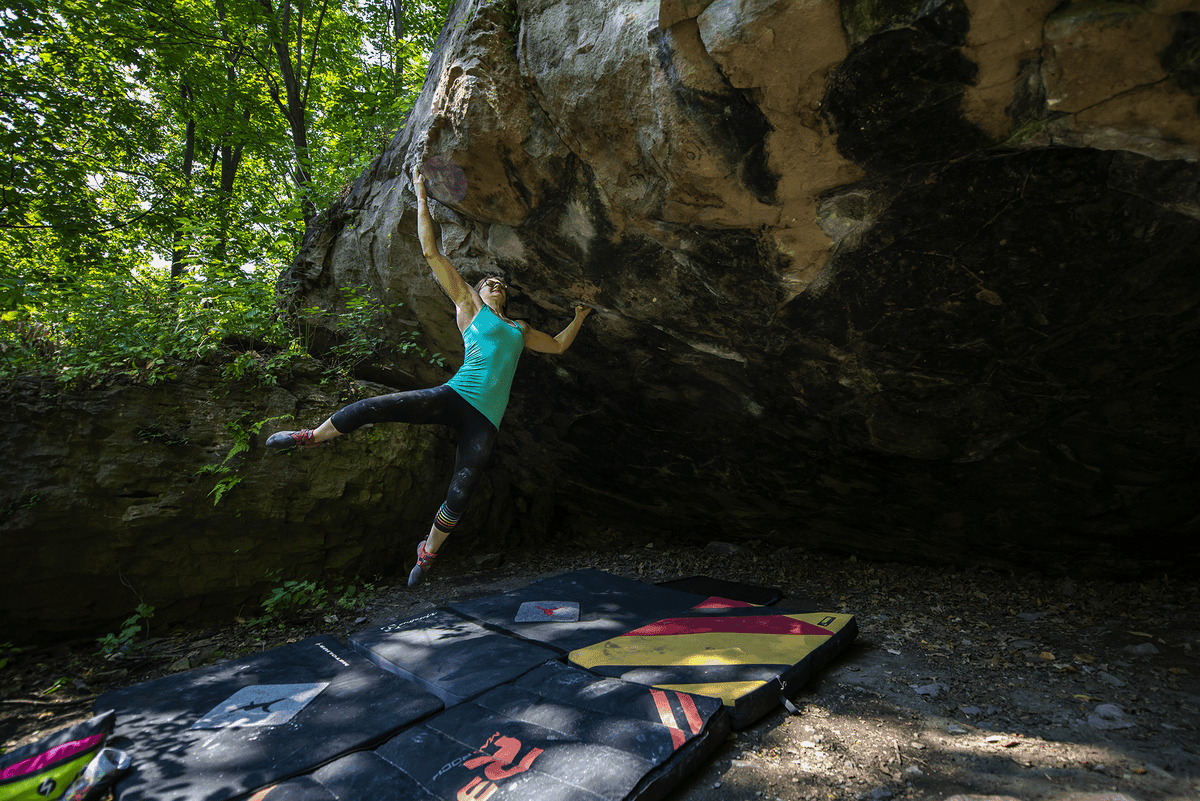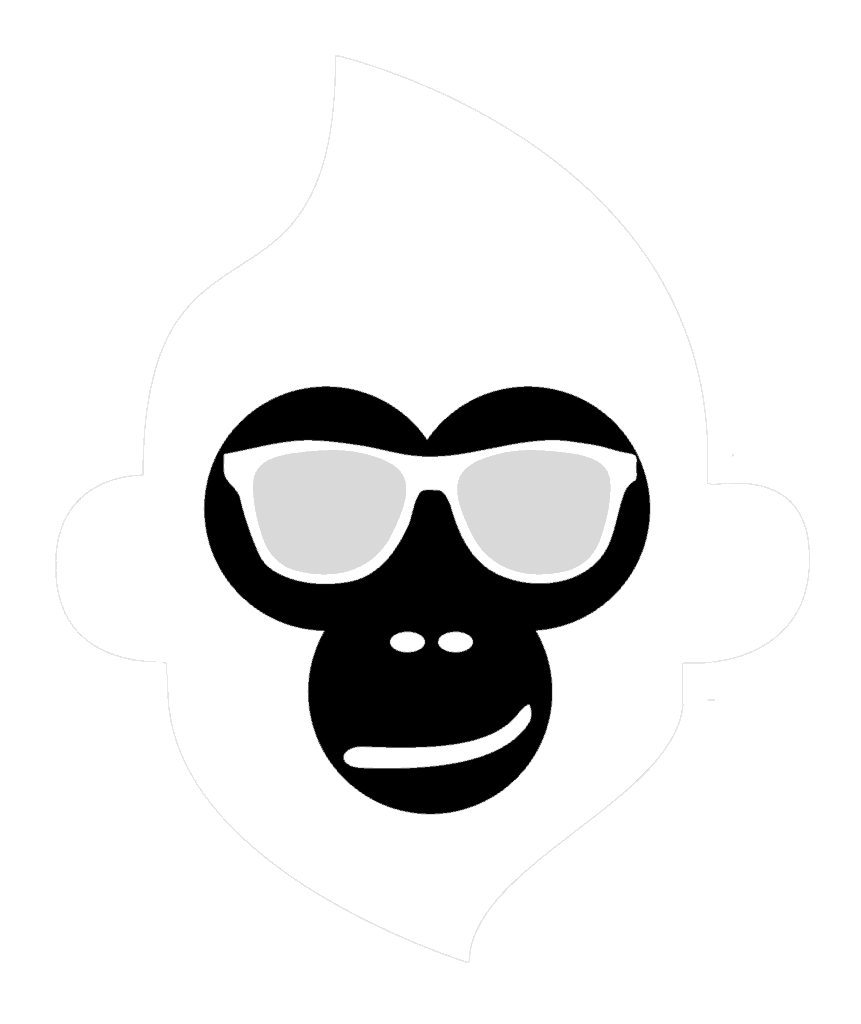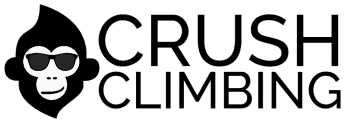
I know what you’re thinking. Philosophy isn’t what I need the most. I need a workout routine, a diet, physiotherapy…etc. and you’re not wrong. A large part of being a strong climber is having a stellar physique with abs of steel and tendons of diamond… but what if that’s not enough? What if preparing your body is only a quarter of the battle? I’m here to tell you, that is indeed the case, and philosophy is the crucial element that can take your performance to the next level.
My name is Madison Fischer. I’m a competition boulderer from Cambridge, ON, Canada. I’ve been competing at Youth World Championships since 2016 and Open World Cups since 2017. I had a rags to riches kind of story. I entered competition climbing as an outsider – I was younger and less experienced than my competitors, yet rose to National Team status in just over a year. Now I’m on the Open National Team and train like a madman. Looking back on these beginning years of my career, I’ve constantly asked myself what made the difference. What did I do to succeed? What sets me apart and what continues to allow me to perform? And the answer was simply – Philosophy.
What is Philosophy?
It’s a number of things. It’s trusting your training program, it’s being able to see the success in a poor result, it’s finding the fortitude to bypass immediate satisfaction for a chance at achieving something bigger. Philosophy is how you stay mentally strong through arduous times to keep reaching higher in sport and in life.
There are two main types of philosophy that I focus on, and those are trust and confidence.
Trust – the improvement factor. Building trust is what allows you to be consistent in your training. There needs to be trust in coaches, exercises, long/short term plans, even your climbing shoes, in order to succeed. I struggled a lot with trust last year. I had just removed myself from my climbing team, and was largely on my own for training. I began doubting whether I knew what I was doing or if anything was going to pay off. Questions that wouldn’t stop circling my head were, “Am I under training?” and “Should I add exercises X and Y?”. Building trust in my plan was what got me through those few months and kept me on track, on task, and moving forward.
Confidence – the performance factor. Some people ooze confidence, others lack it altogether. I was always more in the middle. Confidence is interesting, in that it can be squashed by some things and elevated by others. It’s akin to ego, in that sense. Things like other competitors, the distance of a dyno, the clothes you wear, and the size of your biceps can have a make or break effect on your confidence. I remember my first World Cup. Unsurprisingly, my confidence was shot the minute I entered the isolation zone. Sitting there for nearly six hours watching some of the fittest women I’ve ever seen come and go made me doubt my own physique. It didn’t help that I idolized many of them as a young climber and they didn’t even know my name. Now I’m a lot more focused on myself at these events, and at the gym which has effectively ended my preoccupation with other people’s training and results.
Developing these two ideas can be a huge advantage in your skill arsenal. One may need more development than the other, but that’s all part of finding your philosophy. Everyone is different, so maybe you don’t struggle with constantly comparing yourself to other climbers, but you chase numbers in the weight room. While I wish I could list every possible application of trust and confidence for you, I’m afraid I only know what challenges me. However, the one thing I do know is that you are not perfect and there is work to be done, somewhere within these ideas.

Madison projecting Black Eagle, V9. Photo via Francis Cheng.
How to Train It
So you’re probably thinking, “This all sounds great, Madison, but how will I become more trusting and confident?”. Well, let me tell you it won’t be the most conventional training program you’ve ever encountered but where there’s a will there’s a way.
Step 1: Thinking.
Start becoming aware of your thoughts. This step isn’t about writing things down or doing sets/reps, just think. Catch yourself avoiding a problem and think – why didn’t I climb it? Was it because I thought I’d fall on it in front of people? Did it look too hard? Did I see someone really strong fall on it? Find the source of the issue and move on. No action required, just acknowledge. This could even be practised outside of the gym. If you find yourself disappointed by a low turn out at a party or too few likes on your most recent post, stop to think. Why am I feeling this way? Does this say anything about me? You’ll find you miss things here and there at the beginning, but once you start getting the hang of it, you’re ready to move on.
Step 2: Meditation.
This part is a game-changer. I’ve just begun meditation, but I already feel enlightened, calm, and collected at the gym and in general. So here’s how you do it. Everyday you are at the gym, be it training, stretching, or climbing, start your session off meditating. You can find your own guided meditation online, or you can take a lend of mine. I find a corner of the gym that’s not too busy. I’ll sit down and set a timer for 12 minutes. For the first two minutes, focus on what makes you afraid, stressed, or uncomfortable – other competitors, injury, missing opportunities, really dive deep on this. Just like Step 1, acknowledge these thoughts and move on. After that, you’ll have five minutes of deep breathing – four seconds in, four seconds out. Let your mind be at ease, focusing on your breath. Next is another five minutes focusing on what you’re about to do. Go over the warm up, how it feels to do jumping jacks or skips in your shoulders all the way down to your toes. Think about the exercises you’re doing and which muscles are going to be activated. Think about what putting equipment on correctly feels like, and where you put your plates or chalk between sets or problems. This is the step where you write things down – valuable thoughts and completed sets are the big ones. For me, I noted when I started closing my eyes for this. I found it difficult to close my eyes in public for fear of people thinking, “What is she doing?” or “Is she sleeping?”. But guess what? I meditated on that and now I close my eyes every time, without worry. The “trick” with meditation is the same as the key to any skill. Be consistent. Keep recording your meditations even if you don’t think it went well. Just show up and take it seriously, and you will improve.
Step 3: Practice.
Now it’s time to challenge yourself. You’ll still be keeping up with meditation, but now you’ll go back to Step 1 and get on that avoided problem. Don’t look at the likes when you post something, or better yet, delete social media altogether (But that’s a topic for another day). Ask someone out, don’t make excuses when someone asks you whether or not you sent a boulder. Embrace failure for what it is, don’t try to rationalize or ignore it. Here in Step 3, you can take risks and witness your progress as a person. Look at big moves or small holds not with doubt but with eagerness.
Now What?
So you’ve gotten to Step 3, eh? Well I guess that’s it, you can pack up and go home, right? Wrong. This is a skill like any other that requires maintenance or it will be lost. Your mind will also continue to challenge you. New fears will arise with time and there’s no other way to combat them than to stay mindful. If you think there’s nothing left to explore and you’re cured of jealousy, rage, and uncertainty, you’re not. You may never get there, but isn’t it worth getting close? I was stuck in Step 1 for two years, without knowing it. My step-father urged me for months to try meditation, but I didn’t trust it. How, I thought, could meditation translate to less nerves at a competition, less fixation on my competitors, and less ego at the gym? So I said no. One day, I was at the gym and I fell on a problem much below my typical onsight level. The excuses, shame, and embarrassment that came over me was itself an embarrassment. So, I went home and decided to do whatever it takes to be mentally strong, and I haven’t looked back since.
Being an athlete is more than the tangible. Yes, you need training, competition tactics, and overall health awareness, but I’m a huge believer in the mental side. I can honestly say that trust and confidence are the most important aspects of my continued high performance and clarity through life. So go on, find your philosophy, and for related reading, please see the list below.


